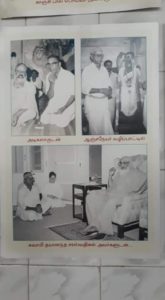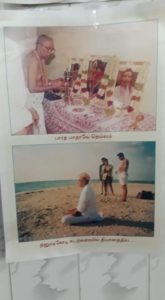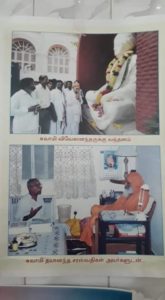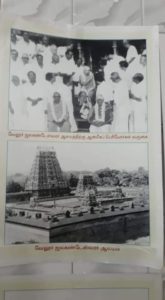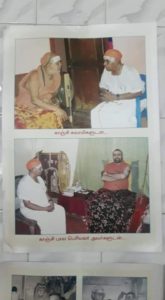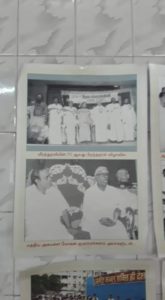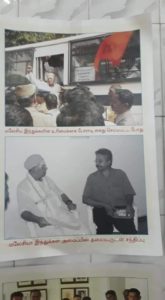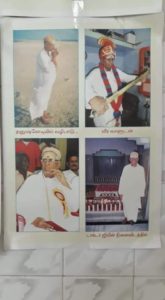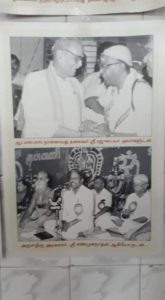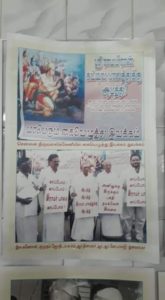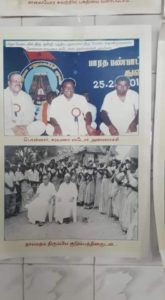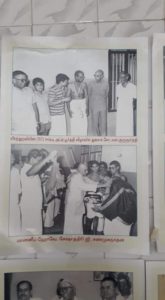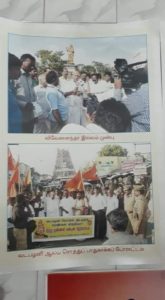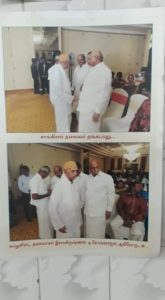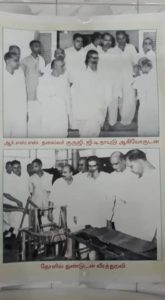
The Sangh Parivar and entire Hindu nationalist movement in Tamil Nadu has suffered an irreparable loss with the passing away of Shri. R. Ramagopalan, founder President of Hindu Munnani and Sangh pracharak; fondly known by thousands of swayamsevaks and karyakartas as Gopalji. Gopalji attained the lotus feet of Almighty on 30th September, 2020 at the ripe old age of 94 years, a life of dedication for more than 70 years.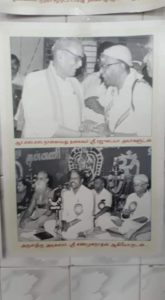
Gopalji was a multi-faceted personality which flowered to the fullest extent throughout his life.
An agitated youngster:
Born on 19th Sept, 1927 in Sirkazhi, Nagapattinam district, Gopalji first got introduced to Sangh through a colleague while studying at a Chengalvaraya vocational training institute in Purusaiwalkam, Chennai. He started attending Shakha from 1944. A visit to the refugee camp for victims of partition in Avadi agitated him very much and made a very deep impact on Gopalji. It created an unending urge in him to serve Hindu society and become part of Sangh activities. He decided to become a pracharak in 1947, leaving his job in an electrical company in Gudiyatham town near Vellore.
An excellent Samparka Pramukh:
Within a short time he became Jilla Pracharak for Madurai District, in which capacity he organised a large gathering on the occasion of Guruji’s 51st birthday. The fact that the meeting was presided over by the great nationalist leader and follower of Netaji, Pasumpon Muthuramalinga Thevar, shows how well Gopalji maintained his samparka network among all sections of society. Soon he rose to become the Prant Pracharak of RSS in 1964.
A Master Organiser:

He played a crucial role during Emergency (1975-77), during which time he was the Saha-Pranta Pracharak. He ably and successfully led the organization as well as all the democratic forces by organizing various protests against Emergency. He later penned down the various activities carried out during Emergency in the form of book in a lucid manner.
An expert in rekindling the nationalistic spirit
He was instrumental in starting of Desiya Chinthanai Kazhagam (Prajna Pravah) in Tamilnadu while he was the Pranta Pracharak of RSS in order to strengthen the nationalist spirit in the State which was vitiated by the divisive forces. At a time there was propaganda to the effect that Tamil being a separate language and Tamilnadu being a separate state by the Dravidian forces, he brought out more than 100 books written by many Tamil scholars highlighting the oneness that prevailed right from the Sangam period (ancient times) with proof from the Tamil literature which firmly established that Tamil and Tamilnadu are integral part of Bharat. This had a profound effect on the Tamil intellectuals.
Similarly, he started hand-written magazines by name Nanneri and Thyaga Bhoomi highlighting the Hindutva ideology and oneness of Tamil and Tamilnadu, which later became a weekly magazine by the name Thyaga Bhoomi and later Vijaya Bharatham.
An excellent motivator:
During the years as pracharak he brought hundreds of youngsters into the Sangh fold and organised them into permanent and dedicated local units in every corner of the state. Most prominent leaders of Parivar organisations today including BJP, ABVP, VHP, Vidya Bharati etc were either introduced to Sangh or mentored by him.
An Undisputed Hindu Leader:
In the Sangh executive meeting held in Karur in 1980, taking into account the anti-Hindu forces prevailing in Tamilnadu, he was given the responsibility of starting Hindu Munnani, which is at the forefront of defending Hindu society in Tamil Nadu till today. It is important to know the situation of Hindu society in the decades before Hindu Munnani was formed. Hindus of Tamil Nadu were facing threats from so many quarters that nowhere else in India were Hindus in a more precarious position. Over two centuries colonialists and missionaries had sowed seeds of discord among Hindus by manufacturing artificial caste differences, especially in south Tamil Nadu. The numerical strength of converted Christians in Kanyakumari was strong that they started a movement to rename the district as “Kanni Mary” or Virgin Mary district. In Ramanthapuram, Muslim organisations were issuing open declarations that they would be converting lakhs of Hindus within targeted periods. On the other hand, the ideological mentor of the ruling dispensations of the time, the Dravidar Kazhigam (DK), was sinking to extremely low levels of public discourse and goddesses by hitting the idols of Lord Rama with chappals and holding obscene debates denigrating Hindu Gods and Goddess. Though the Hindus were by and large pious and religious, they were timid and kept quite by being mute spectators. They were waiting for somebody to lead the protest against the anti-Hindu activities of DK. Sri Gopalji/Hindu Munnani filled the vacuum which resulted in Hindus cutting across caste barriers rallying around Hindu Munnani. Within a short time Hindu Munnani became a mass movement so much so that in many villages people started putting banners announcing the starting of branches of Hindu Munnani without anybody approaching them. The spread of Hindu Munnani became a catalyst for the growth of RSS in Tamilnadu after 1980s.
A courageous leader:
He channeled the Hindu outrage in the wake of the Meenakshipuram conversions and created an unprecedented momentum for Hindu resurgence in Tamil Nadu. Gopalji’s success rattled the anti-Hindu forces so much that they resorted to unprecedented violence against Hindu activists. While fundamentalist elements regularly attacked Hindu Munnani activists, the governments under Dravidian parties also targeted or arrested only the Hindu activists every time there was a confrontation caused by these anti-Hindu forces. As is well known, attempts were made on Gopalji’s life itself on multiple occasions, the most well known incident being the brutal attack on him in Madurai railway station in 1984 which left a permanent scar on his head. Undeterred he started touring Tamilnadu with tirelessly with redoubled enthusiasm. As a result people started calling him with the adage ‘Veera Thuravi’(a courageous saint). The Hindu Munnani office in Chintandripet, Chennai was attacked with bombs by the same individuals who caused bomb blast in the Sangh karyalayam in 1993. Even in recent past Hindu Munnani offices in other parts of the state have also been attacked with petrol bombs etc. It was in this atmosphere that Gopalji steered the Hindu Munnani organisation with great success.
A successful leader in bringing out the hidden potential of women
Realising that role of women being crucial in Hindu consolidation, he revived the practice of Vilakku Pooja (Worship of the Lamp) which grew from hundreds to lakhs which resulted in women raising voice against the injustice meted to the Hindu society.
A builder of mass movements:
He led many mass movements viz., installation of Shiva Linga in Jalakanteswarar temple, running of the Thiruvarur Temple chariot which was stopped for decades, reclaiming of Dhanuskoti, Rama Setu etc.
Through the Hindu Munnani organisation, Gopalji was instrumental in converting a neighbourhood Ganesh pooja in Triplicance locality into a statewide movement within a short span of time. From one Ganesh visarjan in Triplicane in 1983, it is estimated that more than 50,000 Ganesh visarjans happen today all over Tamil Nadu.
A Man of Creativity:
He always came out with creative ideas for furthering the Hindu consolidation work and for reaching out to the masses. He was instrumental in Hindu Munnani holding thousands of street corner meetings without any expenditure. Similarly, he introduced Gram Sabhas wherein the villagers themselves will come together and discuss the issues confronting them and find solution for the same.
A crusader against illegal activities:
Under Gopalji’s guidance, Hindu Munnani activists have successfully blocked illegal missionary activities and unauthorised church constructions on several occasions throughout the state. In accordance with ancient Hindu wisdom, Gopaji not just relied on ‘shakti’ but also ‘yukti’ while defending Hindu society.
A store house of talents:
Gopalji was a store house of variety of talents, some in-born and some acquired. He was a voracious reader, author, poet, Vamsi Vadhak etc. During his younger days he had a desire to learn Carnatic Music from the legendary G.N.Balasubramanian. However, destiny had a different plan. As a result, his music talent flourished in Sangh and he developed hundreds of Swayamsevaks to sing patriotic songs. Songs written by him have been inspiring swayamsevaks and Hindu karyakartas for decades. Some of his patriotic songs have left an indelible impression in the hearts of the Swayamsevaks. He has written very well researched and highly engaging books, including one large one on the emergency. He was a Vamsi Vadhak and used to play it until he was 75 years. Under his leadership Hindu Munnani brought out hundreds of small books for the common people highlighting the various issues confronting the Hindu society etc., which were sold in lakhs. His trademark writing style however is creating pamphlets with sharp bullets points that will leave a deep impact on any reader. Thousands of such pamphlets from Gopalji have been instrumental in countering Dravidian, missionary and fundamentalist propaganda for the last several decades.
A perennial source of inspiration:
His complete commitment to the Hindu cause kept him active well into the 9th decade of his life. His skills as a master organiser and life of total dedication will continue to inspire Hindu karyakartas in Tamil Nadu till Hindu resurgence is complete.
Some photos:
